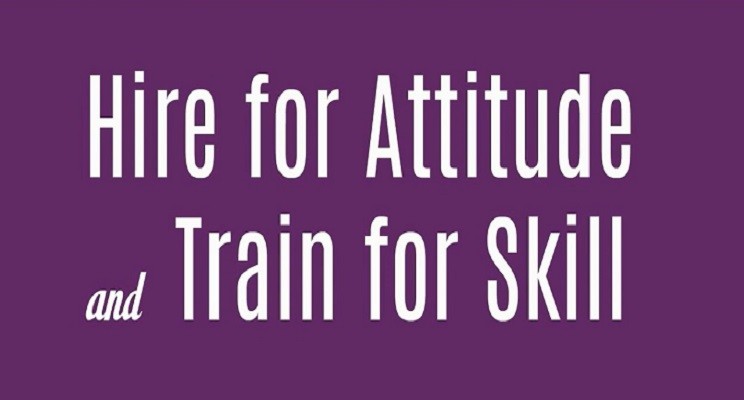There was a time when being good on the job was good enough; however, with current realities in the business landscape, companies are recognizing that technical know-how alone isn’t enough to build high-performing teams.
As industries adapt to new technologies and changing consumer expectations, a different hiring mantra is gaining momentum: “Hire for attitude, train for skill.”
This approach flips the traditional recruitment strategy on its head. Instead of zeroing in exclusively on experience and technical qualifications, it emphasizes mindset, motivation, adaptability, and cultural fit.
The philosophy is simple but profound—you can teach someone how to use software, but you can’t teach them how to be resilient, passionate, or a team player.

The Rationale Behind the Approach
At first glance, hiring for attitude might seem risky, especially in technical fields. After all, you want someone who can hit the ground running. But consider this: skills become outdated, sometimes within months. What’s hot today might be obsolete tomorrow. On the other hand, a person’s core values, emotional intelligence, and willingness to learn remain relatively constant and can be predictors of long-term success.
For an in-depth look at why attitude is the ultimate silent advantage in business,
READ THIS: Why Attitude is the Silent Business Advantage You Should Never Ignore in 2025.
The Limitations of Skill-Based Hiring
Hiring based solely on technical skill or years of experience is like hiring someone based on the tools they carry instead of how well they know how to use them in different situations. Here’s why this strategy often backfires:
- Poor cultural fit leads to friction within teams.
- Low adaptability can make it hard for skilled workers to adjust to new systems or protocols.
- Entitlement or arrogance may come with highly skilled hires who aren’t humble enough to learn or collaborate.
- Skill mismatch is common, as resumes can be exaggerated or misinterpreted.
In contrast, a person with a great attitude may lack specific technical skills but will be eager and quick to learn, motivated to succeed, and more likely to stick with the company.
What Does “Attitude” Really Mean?
“Attitude” in this context goes beyond just being cheerful or polite. It includes a combination of traits and mindsets that indicate whether a person will thrive, adapt, and contribute meaningfully to your company’s vision.
Key Attitude Traits to Look For
- Growth Mindset—The belief that abilities can be developed through hard work and feedback.
- Work Ethic—Willingness to take initiative and go the extra mile.
- Team Orientation—A collaborative spirit and interpersonal sensitivity.
- Resilience—the ability to bounce back from setbacks and learn from mistakes.
- Coachability to feedback and a desire to improve.
- Cultural Alignment—Shared values and behavioral traits that resonate with your company’s environment.
When employees possess these traits, they make excellent team members and also become the catalysts of organizational growth.

The Business Case for Hiring Based on Attitude
Hiring for attitude isn’t just a feel-good philosophy; it’s backed by business logic. Here’s how it translates into tangible benefits for your organization.
1. Increased Employee Retention
People with the right attitude often display higher engagement and loyalty. They’re in it for more than just a paycheck—they believe in the mission.
This intrinsic motivation reduces turnover and saves you the cost and disruption of constantly rehiring and retraining.
2. Faster Onboarding and Development
A positive, proactive attitude accelerates learning. Employees who are curious, humble, and determined to pick up new skills faster. They’re more receptive to mentorship, more likely to ask the right questions, and less afraid to make and learn from mistakes.
3. Stronger Team Dynamics
One bad attitude can poison a whole team. Conversely, one highly motivated, empathetic team member can lift the performance and morale of everyone else. Attitude impacts collaboration, creativity, and workplace harmony in ways that skills cannot.
4. Better Customer Service and Representation
No matter the department, employees with great attitudes tend to interact better with clients and customers, representing the brand in the best light. They’re more patient, understanding, and solution-focused.
5. Future-Proofing Your Workforce
In an era of rapid change, you need employees who can evolve along with your business. The right attitude ensures that your team members are agile learners and open to change, making them more future-proof than any static skill set.
Real-World Examples of Hiring for Attitude
1. Southwest Airlines
Famous for its people-first approach, Southwest Airlines hires people primarily based on their personality and attitude. Their logic? You can teach someone how to fly a plane, but you can’t teach them how to be kind or customer-centric. This strategy has earned them one of the best customer satisfaction records in the airline industry.
2. Zappos
At Zappos, the online shoe and clothing retailer, cultural fit is so critical that they offer new hires $2,000 to quit after the first week of training—if they feel the company isn’t right for them. The idea is simple: only those who are genuinely aligned with the brand’s values and customer obsession will stay.
3. Google
Although a tech giant, Google doesn’t just look for coding skills. They place a high value on traits like humility, collaboration, and intellectual curiosity. Their famous structured interviews are designed to assess how a person thinks and reacts, not just what they know.
People Also Read: 10 Ways to Manage Conflicts and Disagreements in a Business Team Without Losing Morale
The Role of Training in Closing the Skill Gap
Once you’ve hired someone with the right attitude, training fills the skill gaps. Thanks to modern learning technologies, training no longer needs to be time-consuming or expensive.

Strategies to Effectively Train for Skill:
- Structured Onboarding—Set clear goals, provide mentorship, and ensure access to learning resources.
- On-the-Job Training—Allow new hires to learn by doing, with close supervision and real-time feedback.
- Microlearning—Offer bite-sized training modules that are easy to digest and implement.
- Mentorship Programs—Pair new hires with experienced team members to speed up learning and socialization.
- Continuous Learning Culture—Encourage curiosity, experimentation, and self-development through subscriptions, courses, and team challenges.
The beauty of training is that it can be customized, updated, and scaled. Attitude, on the other hand, is much harder to retrofit.
Challenges and Considerations
Despite its benefits, hiring for attitude does come with challenges:
1. Harder to Measure
Attitude is subjective and harder to quantify than skills. Structured interviews, behavioral assessments, and personality tests can help, but they still require intuition and experience.
2. Longer Ramp-Up Time
Employees without the necessary skills may take longer to become productive. This requires patience, planning, and an effective support system.
3. Team Balance
While attitude matters, some roles require baseline technical competence. For example, you can’t hire a surgeon or software architect based purely on attitude. The balance of attitude and skill must be calibrated to the specific job.
How to Assess Attitude During Hiring
It’s one thing to say “hire for attitude,” but how do you identify the right attitude during the hiring process?
1. Behavioral Interviews
Use STAR (Situation, Task, Action, Result) questions to assess how a candidate handled past challenges.
Example: “Tell me about a time when you had to learn something completely new. How did you approach it?”
2. Situational Judgement Tests
Present candidates with hypothetical scenarios to see how they think, react, and prioritize.
3. Cultural Fit Assessments
Ask questions that reveal their values, ethics, and interpersonal approach.
Example: “What kind of work environment brings out your best performance?”
4. Trial Projects or Internships
Short-term trials allow you to observe attitude, adaptability, and team interaction before making a long-term commitment.
5. References and Backchanneling
Ask former managers about the candidate’s coachability, work ethic, and behavior under stress, not just their performance.
When to Prioritize Skill Over Attitude
Though attitude should be a priority, there are exceptions. In certain high-risk or senior-level roles, immediate competence is critical. For instance:
- Medical or aviation roles require specific licenses and technical competence.
- Short-term contracts may not allow time for training.
- Critical launch periods may demand plug-and-play expertise.
The ideal strategy is to find people with both attitude and skill, but if you must choose, go for an attitude with the potential to develop skill.
Final Thoughts: The Human Element
At its core, the “hire for attitude, train for skill” philosophy is about seeing people as human beings, not just resumes or checklists. It’s about betting on character, potential, and work ethic. It’s about building teams who believe in the vision, support one another, and grow together.
The business world doesn’t just need more coders, analysts, or marketers. It needs problem-solvers, empathetic leaders, and people who care. These are not things that can be taught in a training session, but they are the very traits that will carry your organization forward.
So next time you’re hiring, look beyond the credentials. Ask yourself, “Will this person elevate the team?” If the answer is yes, you can teach them everything else.



1 Comment
Pingback: Beyond Competence: Key Character Traits for Achieving Workplace Excellence - Magic Media